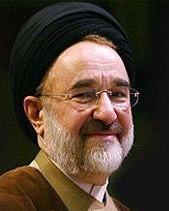Former President Mohammad Khatami has called on the international community to engage in dialogue with his successor to solve longstanding tensions and avoid even greater tension in the volatile Middle East that threatens “global catastrophe.” In an op-ed in The Guardian newspaper, the reformist leader called the current moment an “unrivaled and possibly unrepeatable opportunity.”
 Khatami said new President Hassan Rouhani makes his diplomatic debut at the United Nations with the full backing of the Supreme Leader—which Khatami often struggled to maintain during his own troubled presidency. Khatami also said Rouhani’s message of “hope and prudence” enjoys “widespread support from almost all segments of Iranian society.” The op-ed was published on September 23, the eve of Rouhani’s first speech to the U.N. General Assembly. The following are excerpts.
Khatami said new President Hassan Rouhani makes his diplomatic debut at the United Nations with the full backing of the Supreme Leader—which Khatami often struggled to maintain during his own troubled presidency. Khatami also said Rouhani’s message of “hope and prudence” enjoys “widespread support from almost all segments of Iranian society.” The op-ed was published on September 23, the eve of Rouhani’s first speech to the U.N. General Assembly. The following are excerpts. At my suggestion, 2001 was named the UN Year of Dialogue Among Civilisations. But despite reaching a global audience, the message of dialogue barely penetrated the most intractable political dilemmas, either at home or abroad…. President Rouhani's platform of prudence and hope is a practical translation of the idea of dialogue among nations into the realm of politics. And this is more necessary than ever at a time when a range of overlapping political crises are threatening global catastrophe.
With the initiative of Rouhani, who enjoys widespread support from almost all segments of Iranian society, I hope this country will succeed in steering a path towards global dialogue.
The opportunity to diplomatically resolve differences between Iran and the West, including the impasse over the nuclear issue, presented itself many years ago during my presidency. That opportunity was missed…
President Rouhani's government was elected by a society seeking positive change, at a time when Iran and the wider region was desperately in need of prudence and hope. This vote was not limited to a specific political camp; as well as many reformers, many political prisoners and a significant body of conservatives had a share in Rouhani's victory. For the first time there is an opportunity to create a national consensus above and beyond partisan factionalism – one that may address the political predicaments of the country, with an emphasis on dialogue and mutual understanding globally.
Explicit public support from the supreme leader of the Islamic republic provides Rouhani and his colleagues with the necessary authority for a diplomatic resolution of a number of foreign policy issues with the west, not just the nuclear issue. A peace-seeking Iran can contribute as a willing partner not only to solving its own differences with the global powers, but also to overcoming some of the region's chronic political disputes. But it requires a degree of courage and optimism from the west to listen to the voices of the Iranian people who have been painfully targeted by unjust sanctions, which have threatened the very fabric of civil society and democratic infrastructures.
Failure now to create an atmosphere of trust and meaningful dialogue will only boost extremist forces on all sides. The consequences of such a failure will be not only regional, but global. For a better world – for the Iranian people and the next generation across the globe – I earnestly hope that Rouhani will receive a warm and meaningful response at the United Nations.
Iran today is different from the Iran of years ago, and the consequences of the Islamic revolution are still playing out. Our positive and negative experiences of the past 16 years have added another dimension to the reforms that Rouhani is conducting at both domestic and international levels; they have enriched the Islamic republic's democratic capacities and added, I very much hope, to the experience of the international community.
The Iranian people's vote for Rouhani and his agenda for change has provided an unrivalled and possibly unrepeatable opportunity for Iran, the west and all local and regional powers. With a foreign policy based on dialogue and diplomacy at the heart of the Middle East, we can imagine a better world for the east and the west – including the diplomatic resolution of Iran's nuclear issue, which is utterly feasible if there is goodwill and fairness.
